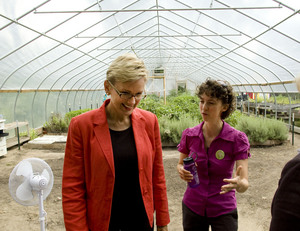Gov. Jennifer Granholm signs bill into law allowing residents to make foods at home, sell it
At the Growing Hope urban farm in Ypsilanti on Monday afternoon, Ann Arbor resident Jeff McCabe handed Gov. Jennifer Granholm and state State Rep. Pam Byrnes his last two “illegal” loaves of bread.
Granholm laughed and thanked McCabe for the “contraband.”
Under two new bills Granholm had just signed into law during a ceremony at Growing Hope, residents like McCabe are now allowed to make and package certain foods in their home kitchen and sell or distribute them to the public.

Gov. Jennifer Granholm holds up a bill she signed into law allowing residents to sell to the public certain foods prepared in home kitchens. Rep. Pam Byrnes, left, and Growing Hope Executive Director Amanda Edmonds applaud.
Tom Perkins | For AnnArbor.com
Previously, residents were required to make their foods in a Michigan Department of Agriculture-certified commercial kitchen - which can be expensive and hard to find - and pay a licensing fee. Granholm said the intent of the new law is to free Michigan’s cottage food industry from unnecessary regulation.
“This is a great way of eluding some bureaucracy and fostering some great, great entrepreneurs in the agricultural field,” Granholm said of the bills, one of which were introduced by Byrnes, D-Lyndon Township.
The law covers businesses that gross less than $15,000 annually. Among the foods included are those classified as “non-potentially hazardous foods," meaning they aren't temperature controlled for safety. The list includes certain baked goods, pies, cereal, candy, dry mixes, popcorn, coffee and other items.
McCabe has long served his breads at a neighborhood breakfast called Friday Mornings @SELMA, which he estimates attracts around 120 people weekly in Ann Arbor’s Old West Side neighborhood. The new law makes it legal for McCabe to serve his breads, which had previously been of concern to local officials.

Edmonds gives Granholm a tour of Growing Hope's urban farm.
McCabe said with the new law, he and a few others are considering sharing a table at a farmers market. People can sell foods at roadside stands, flea markets or fairs. But food to be sold in grocery stores must be made in a certified commercial kitchen and have the proper MDA licensing.
The foods' labels must make clear that the food was prepared in a home kitchen, not an MDA-certified commercial kitchen. The label must also list the ingredients in descending order by weight, allergen information, net weight and display the company’s name and address.
Once a business is making more than $15,000, it will be required to operate out of a commercial kitchen and seek proper licensing.
The bills passed the House and Senate unanimously, while a third covering syrups passed the Michigan House and is in the Senate.

Granholm speaks before signing the bill into law on Monday afternoon.
Tom Perkins | For AnnArbor.com
“This is a bipartisan bill, and I think everyone would agree, Democrats or Republicans, that unnecessary regulation, or regulation that prevents people from becoming entrepreneurs or doing their business, needs to be repealed,” Granholm said.
Ryan Stedman, the manager of Ypsilanti's Farmers' Market, said she is regularly approached by people wanting to sell foods at the market. She said her first question is "Do you have a certified kitchen?" to which the usual reply was "no."
"I had to turn those people away, unfortunately," she said. "They had to be licensed and that takes time and money and knowing what the laws are, and that can be daunting. This removes barriers for lots of people looking to join the local food movement and supplement their income."
The market currently has 40 registered vendors, and Stedman expects to see another five join with the passage of the new law.
Tom Perkins is a freelance writer for AnnArbor.com. Reach the news desk at news@annarbor.com or 734-623-2530.


Comments
Kristin Judge
Tue, Jul 13, 2010 : 7:13 p.m.
Pam Byrnes gets it done again! She is one of the only legislature that works with members of the other party to pass legislation that makes a difference to residents!! Thanks Pam!
leaguebus
Tue, Jul 13, 2010 : 4:01 p.m.
Good points, Ed's Ghost. Jennifer worked with some pretty hostile Republicans for her eight years. Finally something bi-partisan gets done, 6 months before she leaves office. Wish they had done this with the budget once or twice. But when all the Republicans can say is no new taxes, and just no, to most else, are we over the hump? Probably not.
free2eat
Tue, Jul 13, 2010 : 11:11 a.m.
@Verosity, you are correct, big business generally does not own our local establishments. However, local restaurants do purchase factory food from corporations that is made in large quantity and sold cheaply. Don't get me wrong, if I eat out I would choose local over a chain any day.
Tom Teague
Tue, Jul 13, 2010 : 10:43 a.m.
I'm in favor of this law, but Veracity makes a point: There are likely folks who won't handle food safely -- out of ignorance or cost cutting -- and will make someone(s) sick. If a couple of egregious food poisoning cases lead to large settlements, insurance companies will either refuse to write policies for people who are operating them or demand standards before they write those policies. That would, in effect, eliminate the good intent of this law. Better now if the small operators banded together and self certified for cleanliness and good handling procedures. Sort of a Good Housekeeping Seal of Approval for the cottage food industry that give consumers the assurance that they can trust, purchase and enjoy foods from vendors that meet those voluntary standards.
actionjackson
Tue, Jul 13, 2010 : 10:33 a.m.
VERACITY you just need to mellow out and not worry so much about the food around you. Eat, enjoy, and what the heck if you get a little tummy ache now and then so what!
Veracity
Tue, Jul 13, 2010 : 9:46 a.m.
Replies to those criticizing my previous comments-- MY OPINION: When I eat at other people's homes I help with the cooking and can observe what ingredients are used and how clean is the cooking area. JIMMY OLSEN: As a realist I know that food inspectors can not catch all deficiencies. I am aware of the high rate of cook and server turnover at some restaurants. All food inspection services are underfunded and dream of being able to do unannounced inspections of all eating establishments more frequently than they can do them now. Presumably, if unhealthy conditions are observed during an inspection of a home kitchen then the health safety issues can be explained. I assume that all cooks preparing food for private sale do not want their customers to get sick eating their food. If a popular restaurant indulges in unhealthy practices many customers will become ill and the source will be evident quickly. For home prepared goods the linkage between illness and the source may not be as easily identified and remedies obtained. This realization is the basis of my recommendations. JAKE C: You do not have the facts to support your assumption. Ann Arbor has many restaurants with active patronage as I can attest from frequently eating at establishments on Main Street and nearby. Food poisoning is not rampant in this city. Nevertheless I will leave a restaurant if I perceive a risk to my health, which has fortunately not happened often. FREE2EAT: I doubt that even you believe that big business runs all our restaurants downtown. Please tell me which big business interests run any of the dozens or so restaurants on Main Street, Liberty Street, Washington Street, and in Kerrytown. Large chain restaurants do exist but represent a small percentage of eateries in our city. And, by the way, check out the ingredients listed on many products sold at Farmers' Market. Although nutritious organic foods are available, other products contain cheap and unhealthy ingredients. CAROLE: "I almost can make a sure bet that most of the home cooking areas will be much cleaner." Really? How can you make such a claim with any certainty? How often have you visited the kitchens from which your purchased food items were prepared? JBHURON: Be sure to check the ingredient labels required on all home baked products. Ask what specific type of "shortening" is used. Is whole grain flour used or the less healthy bleached-white flour? In order to sell food items at reasonable prices and yet still make a profit, home-based entrepreneurs must use inexpensive ingredients. In this regard they are at a disadvantage to large food companies which can obtain their ingredients with bulk discounts. CAVEAT EMPTOR!!!
jns131
Tue, Jul 13, 2010 : 9:40 a.m.
This is why we don't see lemonade stands. Now we will with a bill like this. Remember this. You had to get a license to set up the stand, a waiver to avoid litigation in the event you had the same signage or something that got in the way of someone else wanting to use your corner. Then you had to put money away for taxes that the IRS comes and takes if you sell lemonade. So glad to see a law like this come into play. Lemonade anyone?
Salinemary
Tue, Jul 13, 2010 : 8:53 a.m.
This legislation is a good thing. I personally look forward to home made items at farmer's markets, etc. If someone is worried about food poisoning or contamination, then don't eat out anywhere. You are no more safe at a restaurant than you are buying home made items. We've turned into a bunch of worry worts. No one used to worry about this stuff.
Cossur
Tue, Jul 13, 2010 : 8:36 a.m.
This is terrific. To the chicken littles out there: any idea how LITTLE $15,000 is? You'd have to search for these sellers if you only trust what comes shrink-wrapped three times over.
jbhuron
Tue, Jul 13, 2010 : 7:54 a.m.
This is great. Score one for the local food movement, and more choices for baked goods that don't have 39 of the 40 ingredients made from modified corn sold by the Cargill and ADM food machines!
Carole
Tue, Jul 13, 2010 : 7:47 a.m.
This is wonderful news for small businesses--definitely will help the "little" people and with regulations that are easy to follow=--list of ingredients and contact information. For those who are so concerned about the cleanliness of the baker's/cooker's home -- maybe you should start checking out some of the restaurants in the area -- I almost can make a sure bet that most of the home cooking areas will be much cleaner. To our new businesses in the baking business -- best wishes.
free2eat
Tue, Jul 13, 2010 : 7:22 a.m.
This is great, our local economy needs the boost. As my name say's we are "free to eat". Big business should not have full control of our food systems. This is a victory for the local food movement! Of course, you too are free to eat cheap factory made edible food like substances if you want to.
Rex Roof
Tue, Jul 13, 2010 : 7:19 a.m.
I wonder how they're going to monitor this $15k limit.
Guinea Pig in a Tophat
Tue, Jul 13, 2010 : 7:02 a.m.
What happens if someone does get sick from a home-baked good? Is liability insurance, like Veracity mentioned, needed? I like the idea but in a I'm-gonna-sue-you world I'm a little tentative.
Snarf Oscar Boondoggle
Tue, Jul 13, 2010 : 6:18 a.m.
WHAAA????? i'm elated! getting thoase 'jack boots' off the neck of entrepreneurs, and really tiny small busindesses, and soem of the greatest cooks on the planet!.... H O O R A Y! pse to publish teh explicit list of 'ok to make' items, rsn.
SMAIVE
Tue, Jul 13, 2010 : 5:33 a.m.
Picture of little Suzy or Sammy "helping" and the cat walking across the counter...
racerx
Tue, Jul 13, 2010 : 2:44 a.m.
What health controls are being put in place? Though a licence will not be needed, how do I know that a home baker's cat isn't milling around the dough? That's ok, I'll pass.
amazonwarrior
Mon, Jul 12, 2010 : 11:20 p.m.
Many years ago, I had a next door neighbor who ran a catering business out of his apartment in Ypsi, and I was frequently awakened by the crashing and banging of pots and pans being washed in the bathtub late at night. Wonder what ever happened to that guy? Food prepared in someones home kitchen for sale to the general public, I think this is a really, really bad idea.
Jake C
Mon, Jul 12, 2010 : 10:06 p.m.
"When eating food prepared in a home kitchen you should retain a small portion (along with any label) and refrigerate for a few days. If you become ill then you can have the sample tested. Testing is the only way to establish that a food source produced illness. An itemized receipt for payment[...]" Uhh, if you feel the need to do this with bread or cupcakes sold from a folding table, my guess is that you probably shouldn't bother with eating out in the first place. Who really has the time or effort to keep some itemized receipt along with a random food sample in their fridge for 3+days just in case someone in the house gets sick? Seriously, you're probably more likely to catch something from a nearby burrito-joint, Chinese-food restaurant, or Gyro stand than from some Girl Scouts selling Banana Bread & Cupcakes from their roadside stand.
Jimmy Olsen
Mon, Jul 12, 2010 : 9:41 p.m.
@Veracity "the same one that inspects and certifies our restaurants." You must think that these people do a good job. Last time I was waiting for my pizza at a local chain - the gentleman took my money, then proceeded to make more pizza without washing his hands. Do you think inspectors catch everything? I called him out on it - dirty money, dirty hands, dirty pizza - number one health department rule.
MyOpinion
Mon, Jul 12, 2010 : 9:23 p.m.
Veracity, When you eat out at other people's houses, do you save samples of all the home-cooked items served to you just in case you get sick? Keeping receipts of all items you ever buy/consume just in case you get sick and can be the provide the solution to the salmonella outbreak.... Whew.
Veracity
Mon, Jul 12, 2010 : 7:09 p.m.
You should question whether home-made cooked/baked foods sold to the public are always prepared following strictly sanitary guidelines. In this regard, purveyors of home made foods should submit recipes to the local food inspection service (the same one that inspects and certifies our restaurants). The food inspection service should provide instructions for minimum food safety preparation customized to the type of food being prepared. Ideally, the home kitchen would be inspected and preparation of items for sale be observed. Some potential health issues may be averted by this process. Regarding health issues, home cooking entrepreneurs should seek liability insurance in case their products produce illnesses due to poor preparation or inadequate storage. Salmonella and E. coli contamination can risk lives occasionally and can lead to personal injury suits. Similarly fish and peanut allergy can occur with minute exposures such as from inadequately cleaned cooking containers or utensils that are also used to prepare other foods. When eating food prepared in a home kitchen you should retain a small portion (along with any label) and refrigerate for a few days. If you become ill then you can have the sample tested. Testing is the only way to establish that a food source produced illness. An itemized receipt for payment should be requested at the time of purchase which will provide evidence for the source of purchase of any tainted food item.
Top Cat
Mon, Jul 12, 2010 : 6:37 p.m.
I knew if we waited long enough, Granholm and Byrnes would actually figure it out and do something to help make people more productive and self-sufficient. Where there is life, there is hope.
Halima
Mon, Jul 12, 2010 : 5:34 p.m.
Good call by the legislature - removing barriers to market entry, while making sure that consumers have adequate information to make decisions. This is a good way to boost the economy. When I first saw this article, though, I expected that it would cover individuals who make tamales in their homes and sell them outside gas stations, video stores, etc. in Detroit and Grand Rapids. Apparently this would remain illegal, since I cannot imagine how tamales could be made in a non-temperature controlled manner.
yohan
Mon, Jul 12, 2010 : 5:06 p.m.
Jenn is just looking out for herself. After her term as Governor is up she is going to bake and sell "blow you away" cupcakes.